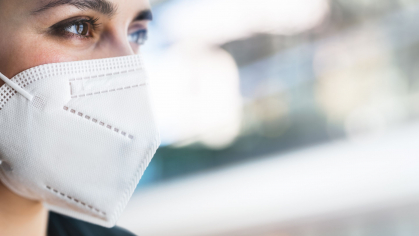Deborah Birx Calls for Continued Caution Against COVID-19 During Visit to Rutgers

The White House coronavirus response coordinator issues reminder that anyone could be infected
Dr. Deborah Birx, the White House’s coronavirus response coordinator, visited Rutgers on Tuesday to learn about the university’s response to the COVID-19 crisis and to reaffirm that all community members need to take precautions to stop the spread of the virus.
Rutgers President Jonathan Holloway welcomed Birx, New Jersey Gov. Phil Murphy, state Assembly Speaker Craig Coughlin, and state and university leaders on the lawn outside of Winants Hall and the Old Queens administration building on the Rutgers University-New Brunswick campus. The governor noted recent upticks in positive cases in New Jersey, including among students living in off-campus housing.
“It seems there’s a common theme – a lot of off-campus behavior” is leading to a rise in COVID-19 cases, Murphy said.
Birx said the increases, as cooler temperatures move more people to gather indoors, are early warning signals that call for stepped-up reminders for everyone that people you know well could be infected by the virus even if they don’t seem sick or show symptoms.
She said what is happening on college campuses is indicative of what is going on in communities at large.
“I think there is much more community spread occurring. The college campuses are just a microcosm of what you have out there,” Birx said. “So when you talk about students off campus that is no different than families having parties and bringing people together. The campuses are a reflection of the overall behavior that we see across the nation.”
Birx has traveled to 30 states, covering more than 16,000 miles in recent months, all by car, and visiting many universities along the way.
“We believe that the way to control an epidemic is to speak with communities and have a dialogue about what communities are doing, and in this case, what college communities are doing,” Birx said.
University leaders, including Antonio Calcado, executive vice president for strategic planning and operations and chief operating officer; David Kimball, senior vice president for research; and Vicente Gracias, vice president for health affairs, provided Birx with an overview of Rutgers’ response to COVID-19, from the decision to move to remote instruction and telecommuting in March to a fall semester with a majority of students not living in university housing and taking classes remotely.
“Now our focus is on the spring semester,” Calcado said. “Our goal is to expand our face-to-face courses within reason while starting the process of rebuilding our residential community and those communities we sit within.”
Since fewer than 1 in 10 Americans have the antibodies to coronavirus, Birx stressed that an important message to convey is that just knowing the people you are with is not enough to protect against the virus.
“There is not enough protection that’s going to carry you through indoor activities,” Birx said. “We have to communicate that in a real way because people still believe ‘if I know you, you couldn’t have COVID.’ We have to get past that.”


